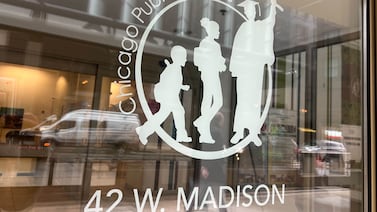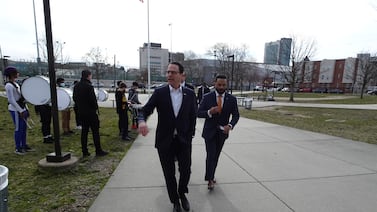At a first-of-its-kind hearing Thursday, State Board of Education members expressed mixed opinions about whether Denver Public Schools rightly dissolved one of its innovation zones.
Leaders of Beacon Network Schools, as the zone is called, are fighting on multiple fronts to preserve their zone as the Denver school board and superintendent place innovation zones under more scrutiny. The zone has filed a lawsuit and appealed to the State Board of Education using a new state law — but DPS doesn’t have to follow the State Board’s recommendations.
Some State Board members said Thursday that ambiguous academic data, strong support from parents and teachers, and inopportune timing — with DPS revoking the zone just as schools are recovering from the pandemic — mean that the Beacon innovation zone should be reinstated and allowed a few more years to show academic improvement.
“These just are not ordinary times,” said board member Angelika Schroeder, a Boulder Democrat, “and we need to be careful to make a pretty significant decision given the kind of support and success that Beacon has had.”
But other board members deferred to DPS’s decision to revoke the zone, arguing that the power to do so rests solely with the local school board. The State Board can review and discuss local board decisions on innovation zones, but it can’t overturn them.
“The law is so clearly unclear here,” said board member Karla Esser, a Lakewood Democrat. “The only thing that’s clear is that this is not in our purview.”
The Beacon appeal was the first test of a state law passed last year that allows the State Board to review innovation zone revocations by local school boards. Unlike in a charter school appeal, the State Board doesn’t take an up or down vote on the local board’s decision.
Instead, the State Board voted Thursday to draft a recommendation based on individual board members’ opinions, which varied widely. Even if the State Board members were united, their recommendation wouldn’t be binding.
That’s because the state law passed last year was a compromise. The first draft of the bill would have allowed a neutral third party to review and override innovation zone revocation decisions. The final version of the bill watered down that provision to a review only.
At the State Board hearing Thursday, Beacon school leaders argued that revoking the zone silenced the voices of teachers and community members who support it. They also argued that DPS’s decision was based on flawed data from pandemic-era state tests.
“We have a district taking a drastic step that invalidates the votes of teachers and silences the voices of a community,” said Andy Ball, an attorney who represents Beacon, “and taking that step based on one pandemic-affected snapshot of student data.”
But DPS officials disagreed. Even taking the pandemic into account, they said that the student test scores at Kepner Beacon, one of two schools in the zone, were exceptionally low. They argued that the district could support the two schools better than the zone could.
“This is not part of a broader anti-innovation or anti-reform agenda,” said Grant Guyer, associate chief of strategic operations for DPS. “This is about maximizing supports to schools.”
The Denver school board voted 5-2 on April 10 to revoke the Beacon zone. Under the zone, the leaders of Kepner Beacon and Grant Beacon middle schools were overseen by a nonprofit board of directors and not by DPS. That gave the zones increased autonomy and budget flexibility — perks that innovation zone advocates hoped would improve student learning.
Revoking the zone returned Kepner and Grant to district control, though district officials said in court last week that they’ve taken minimal steps to reassume control of the schools.
Superintendent Alex Marrero had recommended revoking the zone for several reasons, including that the test scores at Kepner Beacon were too low. Only 21% of students met expectations in literacy on state tests last spring, while 6% met expectations in math.
State law says local school boards can revoke an innovation zone if students are “not improving at a sufficient rate” academically. The law doesn’t define “sufficient.”
Marrero also cited inadequate financial oversight by the Beacon zone board and concerns about the zone’s organizational health. In particular, he opposed the unique employment arrangement of the zone’s executive director, Alex Magaña. Although Magaña was a DPS employee, he answered to the zone board, not to DPS supervisors.
In addition to appealing to the State Board, the nonprofit organization that oversaw the zone, Beacon Network Schools, sued DPS in Denver District Court, seeking an injunction to stop the revocation. The court held a hearing in the case last week, but the judge has not yet ruled.
Melanie Asmar is a senior reporter for Chalkbeat Colorado, covering Denver Public Schools. Contact Melanie at masmar@chalkbeat.org.







